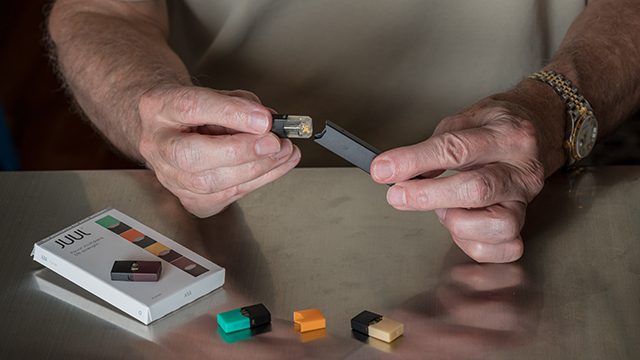SUMMARY
This is AI generated summarization, which may have errors. For context, always refer to the full article.

WASHINGTON, USA – Crisis-stricken e-cigarette maker Juul announced a corporate shakeup on Wednesday, September 25, swapping out its chief executive officer (CEO) for a tobacco industry veteran as the United States legal environment rapidly darkened for the company’s main products.
The company is also suspending all advertising and government lobbying as it responds to a mounting public backlash over the risks of vaping.
At the same time, a potential $200-billion merger between Altria, a major Juul stakeholder, and Philip Morris International collapsed, with the two companies saying Wednesday that efforts to reach a deal had failed.
The transition to e-cigarettes and other devices offered a ray of hope to old-guard tobacco merchants facing a long sales decline and falling smoking rates.
But, with at least 9 dead and hundreds sickened from causes potentially tied to some vaping products, and soaring use among teenagers, the regulatory landscape for e-cigarettes has deteriorated this year.
State and federal authorities have brought litigation and reportedly at least one criminal investigation. Meanwhile, US President Donald Trump’s administration is considering an outright ban on flavored vaping products, which authorities say target teen users.
PM increasingly uneasy
Kevin Burns, co-founder of the San Francisco-based Juul, which had seen a meteoric rise in recent years, will be replaced by KC Crosthwaite, himself a top Altria executive.
In a statement, Crosthwaite said he envisioned a future in line with Juul’s founding mission to allow adult smokers to choose alternatives to smoking tobacco.
“Unfortunately, today that future is at risk due to unacceptable levels of youth usage and eroding public confidence in our industry,” he said.
Under Burns, Juul expanded to 20 countries, forging a global business out of a startup, the company said.
Juul says it has stopped store sales of products with flavors other than tobacco and menthol, ended promotions on Facebook and Instagram, and enhanced online age verification while pushing for stronger rules to keep its products out of children’s hands.
A month ago, Altria and Philip Morris International announced merger talks, potentially allowing the two companies to diversify into the shifting consumer market.
But on Wednesday the two companies said efforts to reach an agreement to forge a $200-billion combined entity had failed.
“While we believed the creation of a new merged company had the potential to create incremental revenue and cost synergies, we could not reach agreement,” Altria chairman Howard Willard said in a statement.
As clouds gathered on the horizon for Juul, the Philip Morris board became increasingly uneasy about the merger with Altria, The Wall Street Journal reported Wednesday, citing an unnamed person familiar with the matter.
Altria purchased a $12.8-billion stake in Juul last year.
Meanwhile, Philip Morris International said it would focus on the rollout of its IQOS device, which heats and does not burn tobacco.
IQOS has been received “premarket authorization” from the US Food and Drug Administration following a “rigorous science-based review” by the agency, according to Philip Morris.
“IQOS is not an e-vapor product,” Philip Morris said.
On Wall Street, shares in Altria were little changed but Philip Morris had surged nearly 5.9% around 1400 GMT. – Rappler.com
Add a comment
How does this make you feel?
There are no comments yet. Add your comment to start the conversation.